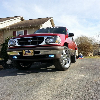midnightsun
Active Member
- Joined
- January 13, 2014
- Messages
- 96
- Reaction score
- 10
- City, State
- Paradise
- Year, Model & Trim Level
- 2022 Explorer ST
Dtr wrote =
When your crap oil breaks down the filters job is to remove the particles circulating in the oil...if it doesn't you are circulating 7 gallons of contaminated oil.
If your engine is leaking any water, gas, or coolant into that oil, you're again circulating 7 gallons of contaminated oil that is probably breaking down faster and causing more wear because of mentioned contaminants.
Oil analysis will tell you what is going on with the oil and its additive package....plus the engine. Clean uncontaminated oil doesn't need to be replaced....whether that be 5K, 10K, 50K or 350K miles in circulation. Again analysis will tell you if the oil should be changed because of additive loss or not regardless of "capacity".
You obviously think you know what your talking about, but from my end i understand you don't.
An ISL engine in a motor home takes 7.3 GALLONS of oil not quarts of oil and is rated for 20,000 miles with nonsynthetic oil.
100,000 miles+ seems a little optimistic even though big rig engines have even more oil than an ISL.
Your mileage seems high and misleading and it is really misleading to those that do not understand the large oil capacity in the Big Rig vs the few quarts in an EX.
When your crap oil breaks down the filters job is to remove the particles circulating in the oil...if it doesn't you are circulating 7 gallons of contaminated oil.
If your engine is leaking any water, gas, or coolant into that oil, you're again circulating 7 gallons of contaminated oil that is probably breaking down faster and causing more wear because of mentioned contaminants.
Oil analysis will tell you what is going on with the oil and its additive package....plus the engine. Clean uncontaminated oil doesn't need to be replaced....whether that be 5K, 10K, 50K or 350K miles in circulation. Again analysis will tell you if the oil should be changed because of additive loss or not regardless of "capacity".
You obviously think you know what your talking about, but from my end i understand you don't.











